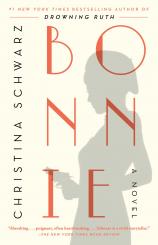Bonnie
Review
Bonnie
In BONNIE, New York Times bestselling author Christina Schwarz immerses readers in the life of 20-year-old Bonnie Parker --- or, as you may know her, Clyde’s literal partner in crime. Evoking the same heightened emotion she so masterfully cultivated in DROWNING RUTH and drawing upon the real Bonnie’s “ripped from the headlines” lifestyle, Schwarz introduces readers to the lady behind the legend, a romantic young girl with the passion of a woman and the naivete of a child.
Born in a small town in western Texas with limited opportunities, Bonnie Parker knows she wants more than the industrial wasteland outside of Dallas where her family settled after the loss of their father. A gifted speller and natural performer, Bonnie is the sort of girl who can actually make it out of Dallas --- bright, enchanting and inherently joy-filled. She is a dreamer through and through, but is haunted by the sense that she is missing something, the feeling of being known. It is this void that pushes her toward romance, most notably with her partner, Clyde, but first with a young petty thief named Roy. Married at only 16, Bonnie, still practically a child, demonstrates the same qualities that would lead her to slinging guns with Clyde and his posse: a blind eye where love is concerned, an infatuation with attention and a nearly unbelievable gullibility when it comes to men.
In short, compulsively readable chapters, Schwarz walks readers through noteworthy moments in Bonnie’s life --- from her dates with men to her friendship with her mother and her first meeting with Clyde, a smooth operator who charms his way into her heart almost immediately. The Clyde we meet is not yet the criminal he would become, but more of an ambling petty thief whose “heists” are less Ocean’s Eleven and more “so crazy it just might work.” He rarely escapes the eyes of the police, but when he does, it is more dumb luck than preparedness and calm-headedness.
"Schwarz is, hands down, one of the most beautiful writers I’ve had the pleasure of reading. She writes with the romantic overtones of V.C. Andrews and Anne Rice, but her prose is never overly flowery or heavy-handed..."
Still, Bonnie is in awe of his bravery and the taste of the outlaw life he adds to her otherwise boring existence. Their courtship is rather conventional at first, but with Bonnie’s mother playing more friend than parent, their relationship proceeds a bit too quickly. Before long, Clyde is arrested, pulled by police right off Bonnie’s family’s living room couch. Bolstered by the romance of it all and viewing their parting as a sort of Romeo and Juliet-like tragedy, Bonnie is more in love with Clyde than ever, and the course of their relationship is set.
As Clyde bounces back and forth from prison to half-assed crime spree to Bonnie’s arms, Schwarz sets the scene of America’s Depression-era Wild West beautifully. The sense of place and time is not only immersive but educational, and though we may not be reading the facts of what Bonnie and Clyde’s beginnings were like, Schwarz certainly provides a plausible, reasonable explanation for their passion and debauchery. While it is true that Bonnie and Clyde lived in a time and remote area where there were few options beyond crime, readers may be surprised to learn that Bonnie was, more or less, a good girl who hated guns. But with her attraction to Clyde growing and his grasp of criminality finally gaining momentum and success, she finds herself riding along on his trips, then keeping watch for the law, and soon brandishing guns and calling shots herself. Bonnie is no angel, and she can definitely hold her own in an argument with Clyde. But she is so wildly naive that readers will want to jump into the book and shake her, or at least hold her hand (and pull her away from Clyde, fast).
Though Schwarz easily highlights the thrill of the outlaw life and the draw of the notoriety, especially for Bonnie, she is careful to provide both sides of the story, stripping away the glamour and explaining that Bonnie and Clyde often felt trapped when they were on the run, a contradiction that made Bonnie feel hopeless. Schwarz explains how the reports of Clyde’s early crimes were exaggerated, but also how careless he was with details.
In one surprisingly humorous scene, Clyde and a friend kidnap a police officer with Bonnie in the car, only to turn on the radio and hear that the police officer’s body has been found decapitated. The report is clearly fabricated, as the lawman is sitting right behind them, but Clyde knows the pressure to catch him will be heightened and the sentence significantly worse if he is caught. Then, only a few chapters later, Clyde attempts to steal a car he doesn’t even want. When the homeowner catches him in the act, he complains that he can’t understand why the man would even care to protect such a piece of junk.
With Clyde leaping back and forth between victim and perpetrator, one would think that Bonnie would roll her eyes and walk away, but intoxicated (literally and figuratively) by his nearness, she dreams only of the day they can stop running. Of course, we all know how that dream ends.
My one complaint about BONNIE is that it can get bogged down in detail, particularly near the end when the book reads more like a rap sheet than a work of fiction. Schwarz is careful to relay every detail of Bonnie and Clyde’s crimes. Although prolific, the duo was not very creative, so every repeated crime tends to drag the narrative down rather than propel it forward. Similarly, as Schwarz becomes more immersed in the actual history, she occasionally loses the threads of the characters’ interiors --- their motivations, fears and shared passions. Through about two thirds, BONNIE is a dreamy, believable exploration of the interior life of Bonnie Parker the woman. But the final act rests on the mythos of Bonnie the criminal, making the book feel almost incomplete, if only because Schwarz so masterfully rendered her Bonnie in the beginning.
Schwarz is, hands down, one of the most beautiful writers I’ve had the pleasure of reading. She writes with the romantic overtones of V.C. Andrews and Anne Rice, but her prose is never overly flowery or heavy-handed. Instead, she is able to summarize major points, complex emotions and nuanced subjects with pointed, sharp turns of phrase that read almost like song lyrics. As a huge fan of DROWNING RUTH, I was a bit worried that she would not be able to control her prose as effortlessly with the pressure of a real-life character pushing her on. But I am thrilled to report that the book is written with tremendous care and a mastery of language that feels singular in its talent.
Despite any criticisms about the heft of the details, BONNIE is well worth reading and recommending, particularly for fans of Marie Benedict and Megan Collins.
Reviewed by Rebecca Munro on July 24, 2020
Bonnie
- Publication Date: February 9, 2021
- Genres: Fiction, Historical Fiction
- Paperback: 352 pages
- Publisher: Washington Square Press
- ISBN-10: 1476745463
- ISBN-13: 9781476745466




